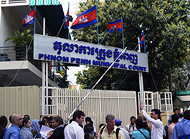Victims of the Dey Krahorm Eviction Continue to be Targeted by Authorities
Published on 2 March 2009On 24 January, 2009 hundreds of families were forcibly evicted from Dey Krahorm in the heart of Phnom Penh. In the month following the eviction, residents struggled with the poor living conditions at the Damnak Trayeoung relocation site while others mounted protests to demand proper compensation for their stolen land and destroyed houses. However, for three former Dey Krahrom residents the repercussions of their struggle to save their land now includes criminal convictions.
On February 16, 2009 three former residents of Dey Krahorm -- Chan Vichet, Khieu Bunthoeun and Ly Youleng -- were convicted by the Phnom Penh Muncipal Court of property damage and physical assault. The charges related to an incident on the night of December 3, 2007 when the 7NG company provoked a confrontation with Dey Krahorm villagers by driving a large mechancial excavator into the village. Afraid that the earth-moving machine would be used to knock down their houses, some villagers (many of them children) threw stones at the excavator and its driver. The incident was one of many confrontations between 7NG employees and villagers over the past three years, as 7NG waged a campaign of intimidation to persuade villagers to give up their homes and leave the village.
At the court trial on February 11, 2009, seven defense witnesses, also former residents of DeyKrahorm, testified that the three defendants never committed any acts of violence on the night in question; to the contrary, several of them testified that Chan Vichet used a loud speaker during the incident to implore residents to cease throwing rocks. Ultimately, however, the trial judge dismissed the testimony of the defense witnesses and accepted 17 nearly identical witness statements of 7NG employees who named the three defendants as the rock throwers.
Chan Vichet and Ly Youleng were given an 18-month suspended prison sentence and were ordered to pay 800,000 riels (USD$200) compensation to 7NG. Khieu Bunthoeun was given an 18-month suspended sentence and four days' imprisonment which he had already served. The three defendants were also ordered to pay a total of 1.2 million riels (USD$300) to two 7NG employees injured during the incident.
The next day Chan Vichet again appeared before the Municipal Court of Phnom Penh. This time he was summoned on charges related to a complaint filed against him in 2005 by former Dey Krahorm community representatives who accused him and seven others of defamation and forgery. Chan Vichet and the other residents had accused the former representatives in March 2005 of illegally signing a contract that gave away villagers' land to 7NG.
An investigation judge started to investigate this case in 2005. In April 2008, the investigation judge dismissed the charges against Chan Vichet and six of the other accused, and decided to maintain the charges against only one person, Lao Seyha. However, in August 2008 following the conviction of Lao Seyha, the Municipal Court re-filed the same criminal charges against Chan Vichet and the others named in the original complaint - despite the fact that these charges had been dismissed in April 2008.
Chan Vichet is currently released on bail, granted by the Municipal Court on the condition that he informs the investigation judge if he moves residence, that he meets with the investigation judge when summoned and that every Friday he reports to the Tonle Bassac police station.
The 7NG company, as well as the local authorities who have supported the company in its bid to take villagers' land at Dey Krahorm, has a long history of filing unjustified criminal complaints against residents - and especially their community representatives. Currently, there are four other open cases of criminal complaints made by 7NG or local authorities against former Dey Krahorm residents. Muncipal Court prosecutors and judges have been complicit in these unfounded legal attacks, by filing criminal charges and convicting villagers despite a clear lack of credible evidence against them.
The experience at Dey Krahorm reflects the broader reality throughout Cambodia: land-grabbers frequently filed baseless criminal complaints against residents and their representatives, in a bid to coerce them to give up their land and to punish them if they do not.
- Topics
- Courts, judiciary & rule of law Land rights
- Related Material







